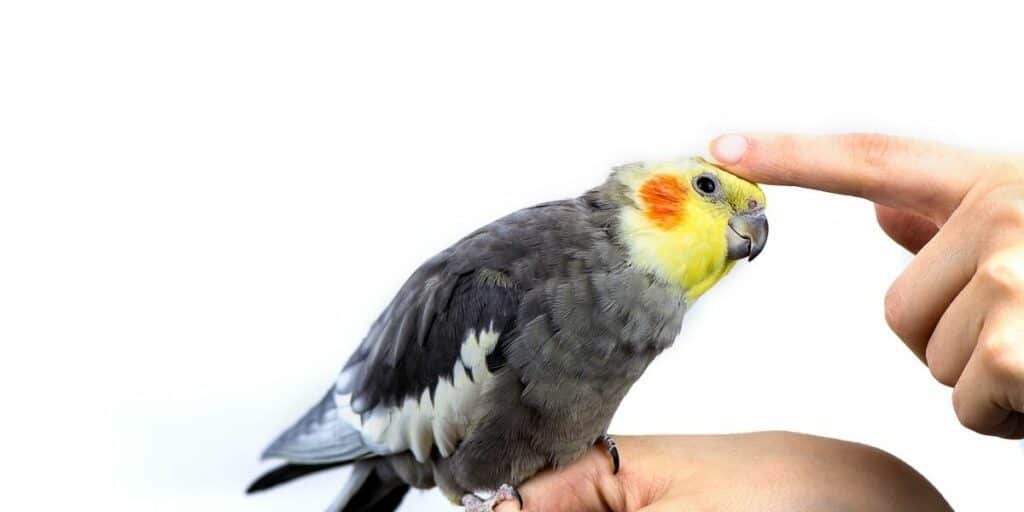All pets need different levels of companionship. Some need constant attention, some prefer to not have any.
Do birds need a companion, or more precisely, do cockatiels need a companion?
Cockatiels are very social birds and they need a companion. That companion can either be the pet owner or another bird. If a cockatiel is left alone for too long, they can become severely depressed, and nobody wants to learn about the fate of a depressed bird the hard way.
Table of Contents
What Kind of Companion
Cockatiels are naturally social birds. In the wild, they come from large flocks of up to 1000 birds. It’s no wonder they need a companion!
A companion for a cockatiel can be the owner or another bird, but there are advantages and disadvantages to both. Pick which one works best for you and your lifestyle!
Humans
We have lives! We have to leave the house for work, for errands, to socialize with others, just to get out of the house… we leave the house a lot, but that means we would be leaving the cockatiel at home by themselves a lot too.
However, If you’re using yourself as your cockatiel’s companion, you won’t have to buy another bird and all of the extras that come with a new pet.
Another Cockatiel
If you want to buy another cockatiel as a companion, you will have to go through a process of introducing the two birds. This could take a while, and you’ll need to buy another cage, a food bowl, and double the amount of food as before.
On the other hand, if your cockatiel has another bird to keep them company, you won’t need to feel guilty about leaving the house for long periods of time.
What Happens If They Are Lonely
A cockatiel won’t die from loneliness, but they might from the side effects of loneliness.
Similar to humans, when a cockatiel is lonely, they will become depressed and lose their appetite. Cockatiels have a really fast metabolism, so if they suddenly stop eating, they can lose weight quickly. When they don’t weigh much to begin with, losing too much weight can affect their overall health significantly.
They will also stop singing and playing, and choose to sit in a corner of their cage to further isolate themselves.
If you are your cockatiel’s companion, and you start to notice these behaviors, try changing something about their environment or care. If you’re leaving them alone during the day, try moving their cage in front of a window. This gives your bird something new to look at while you’re gone.
These could also be signs that something is wrong. Do a quick check and make sure you’ve taken care of the big stuff before bringing your bird to a vet:
- What is the temperature of the room? If it’s below 65 or above 80 you should adjust the temperature back to that zone.
- Does your bird have food and water? If both dishes are full, try giving both the dishes a full clean and refilling them with fresh food.
- Is your cockatiel in a room with a lot of loud noise? Try moving them into another room.
If you’re leaving your cockatiel alone while you go out, try to be back within a few hours. Give them some attention before you leave, and even more attention when you come home.
Don’t forget to give them plenty of toys to play with. Toys will keep your cockatiel busy while you’re gone so they don’t feel as lonely.

How to Introduce a New Cockatiel
There are many reasons why you might need to bring a new cockatiel into the house, but don’t put two cockatiels together in the same cage if they’ve never met before. Instead, follow these steps to get them familiar with each other.
Step 1
Each cockatiel will need their own cage. Put these cages beside each other and let the cockatiels investigate the other from their own cage. You will want to give the cockatiels treats as a reward for good behaviour.
Start slowly, the cockatiels might only be able to handle a couple of minutes of being in the same room as the other. When one of the cockatiels starts acting up, put the birds in different rooms and try again the next day.
Slowly build up the time they can behave until they can be in the same room together.
Step 2
Once both birds are comfortable in the same room together, give them individual play-time in front of the other caged bird. Take out your first bird and give them attention, training, or treats. When you’re done put them back in their cage and then take out the new bird.
Do the same thing with the new bird. This shows them that they are both going to be treated equally, and they won’t need to compete for attention or food.
Step 3
Place a new play area in front of both cages. This shouldn’t be something your older bird has seen or they might try to protect his territory. Open both cages and let the birds investigate. Reward them for socializing.
Start with a few minutes at a time until they get used to each other, and then slowly build up the amount of time they are allowed on this new play area. They might start to investigate each other’s cages, and pretty soon they will be able to be housed together.
Final Thoughts
Cockatiels in the wild live in flocks of up to 1000. If you can’t give your cockatiel the attention of 1000 birds, they are going to need at least one other cockatiel companion to make up for it. Pick whichever works best for your lifestyle, but the important thing is to keep your cockatiel happy.




